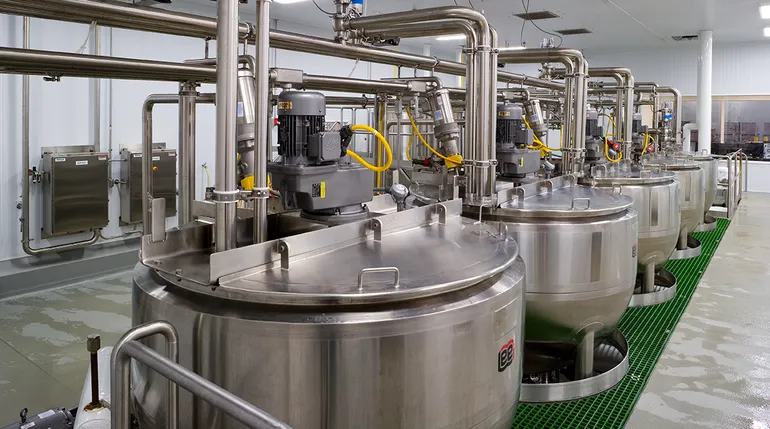5 key factors when considering a used kettle or tank

While there are many advantages to buying a new kettle, buyers may consider purchasing pre-owned equipment from a reputable, food processing equipment reseller.
Aside from the basic choices required when looking for a kettle or tank, such as shape (dished or hemispherical bottom), capacity and agitator type, these other factors are important to consider when deciding whether or not to buy a specific used vessel:
1) Prior use: Determining what ingredients were processed in the used kettle under consideration is an important risk, safety and liability issue. For example, a kettle that was previously used to mix or process hazardous, reactive chemicals or pharmaceutical products may pose too high a risk for use in food processing due to possible cross-contamination from trace chemical ingredients lodged in bushing spaces and other areas. While the used kettle’s original manufacturer may be able to provide general information on the first buyer’s industry, this information may not be available for that kettle’s subsequent owners. So, unless you can establish a clear chain of ownership on a used kettle under consideration, you can never be sure of its prior use history.
2) Safety and potential liability issues due to wear, defects or unauthorized repairs: Processing kettles with steam and water jackets are classified as “unfired pressure vessels” per section VIII of the A.S.M.E. code. A.S.M.E. code guidelines must be followed and documented for any repairs or alterations made to the unit. Any repairs to a kettle can only be performed by a state-certified A.S.M.E. boiler technician, and all such repairs must also be inspected and receive an “R stamp” by a state-certified A.S.M.E. boiler inspector.
Therefore, as in the case of prior use above, it is critically important to obtain a documented record of all inspections and any certified repairs made to the used kettle under consideration. Due to the significant safety and liability risk involved you should absolutely avoid any kettle where an undocumented, uncertified repair has been made.
3) Your custom requirements: Because most kettles on the used market were custom-built for their original owners, the specific features and operating characteristics of the used kettle you’re considering may or may not meet your production and safety requirements. The cost of major modifications — such as rebuilding the agitator drive, replacing worn parts, adding a larger discharge port and general modifications to adequately meet your process, can put the total cost and time of buying a used kettle in-line with those of a new kettle, custom-designed for your needs.
4) New service and parts for preventive maintenance: Most used equipment dealers do not take on the responsibility of performing maintenance on the kettles in their inventory. Therefore, to prevent costly downtime once that kettle is on your production floor, it is essential to have this preventive maintenance done before the kettle is put into operation.
5) Warranties: While new kettles usually carry a performance warranty (e.g., Lee provides a two-year limited warranty), used kettles are most often sold without any warranties, or on an “as is, where is” basis. In some instances, kettles that have been reconditioned by dealers may be sold with limited-time unsupported warranties. Generally, the best you can expect on a used kettle is a short-term warranty, which makes a thorough inspection and preventive maintenance vital to keep production downtime to a minimum.
Is a used kettle the right choice for your business?
As you can see, several important factors affect your decision to buy a used kettle, beyond its purchase price: the kettle’s prior use, its repair or modification history and the cost of preventive maintenance service and parts to ensure trouble-free operation. Each of these issues must be carefully examined to determine the true cost of used kettle ownership, and to guarantee reliable, long-term operation for the used kettle placed in service in your food processing operation.
Learn more about choosing a new vs. used kettle for your food processing operation by downloading the guide: New or Used Kettle: How to Make the Right Choice for Your Food Processing Operation or contact a Lee Industries Application Engineer. We would be glad to help.
Source: fooddive.com

